#yes this is for my french modernism class
Text
So the German dub is out and I would like to offer up to all of you how it deals with the problem of formal/informal form of address because it's really interesting
(Preface: all of this applies how we as modern people use these forms of address. In the actual 18th century, addressing any adult informally was very uncommon, even between close friends. But we're doing a DJenkins approach here)
(@rocketrouquine wrote about how it is handled in the French dub here; also very interesting!)
The thing to understand about formal vs informal you is that it's about politeness, yes - but that's just a very basic understanding. Yes, you are supposed to be formal with people you don't know, but what they don't teach you in highschool foreign language class are all the things choice of address can communicate. Namely, what distance there is between people. About the closeness of a relationship, what level you're interacting on, about signaling how far you will let a person into your life.
The crew of the Revenge all call each other Du (informal) - except for Stede, who everyone calls Sie (formal). Du is for friends and Stede is not their friend, he is the boss. There is a camaraderie and solidarity among the crew that Stede can't partake in. Sie, in this case, is like a barrier that you put up to keep someone from becoming too friendly with you and reminding them what kind of relationship this is (namely, a purely professional one).
This is underlined by the crew obviously and openly thinking Stede is an idiot - and by Stede calling everyone Du. Is it because he sees himself as a social superior who can address people informally but insists on formal address for himself? That's one way to read it! But more interesting and more accurate, in my opinion, is to read this as an attempt by Stede to make himself part of their ingroup. It's especially obvious when Stede invites Olu and Jim to sit with him on the couch in ep1; he's using Du while Olu very poignantly keeps insisting on Sie. It underlines how visibly uncomfortable Olu is sitting there trying to explain to Stede that people choose a life of crime out of necessity, while making Stede seem even more oblivious and out of place.
Interestingly, Stede uses Sie himself to put some professional distance between himself and someone else. Namely, with the tribe elder from ep2, who he addresses formally. Is this a sign of respect? Sure, he has a tendency to go for Sie by default. But it reminds me more of how one would be per Sie with a doctor or therapist; as a reminder that this is a strictly professional relationship. It's easier to be open and vulnerable with someone who you know isn't emotionally invested in your wellbeing, isn't it?
Stede comes from a background where one is expected to address everyone with Sie unless granted permission otherwise. This is a sign of respect, the same way lower class people on this show tend to use Du as sign of solidarity; on Nigel's ship, all the officers call each other Sie. So when Nigel uses Du with Stede, it adds a layer of disrespect, despite it being perfectly acceptable, since they have known each other as children. This is even more evident with Chauncey, who we see interact more with other pirates; when he wants something from someone (Izzy, Spanish Jackie) he calls them Sie, no problem, while Nigel's crew doesn't even make an attempt at showing some respect at the ep1 tea party.
And then there's Izzy. Izzy and Stede call each other every insult under the sun and also address each other formally the whole time, which is the funniest possible choice. Like. I'm not sure why "Sie Arschloch!" is 1000x more bitchy than "Du Arschloch!" but it just is. It's taking this whole game of distance and closeness to a whole new level; I despise you so much I would never entertain the notion of being friendly enough with you to use your first name. Sie Wichser. It's made even funnier by the fact that for Stede, Sie is much more intuitive than for Izzy. It seems like Izzy has to make a lot more of an effort to keep the Sie up, but he's not gonna be the one to break this particular stalemate first, goddammit.
Finally (because that's the really interesting bit, isn't it) Ed. Initially, in ep3, Stede calls Ed Sie, which, of course he would think to do that while he's laying there half dead and bleeding, I love him. Ed echoes this back, because he's determined to "do this right", make a good first impression, and I thought this would be it, they'd be per Sie until the kiss, like it often goes in media translated from English. Fine, I guess.
But then.
When Ed wakes Stede up, he immediately goes for Du. No warm up, no getting to know each other first at all. And it's great! First of all, because Ed of course is the type of person to just call everyone Du, but also because of what happens next: Stede calls him Du back. This is the first time this particular hand has been extended to him, and oh, is he excited to take it.
(Other people call Stede Du first, Spanish Jackie, the chief, but it's not like this; not an invitation)
Stede isn't meeting Blackbeard, he's meeting some guy named Ed. Someone he instantly makes friends with; someone who has already seen him at his worst and so, who he can be himself with. Someone he doesn't need to put up pretenses or worry about proper behaviour with. This scene would have lost so much had they decided to keep up the Sie.
Remember that camaraderie I talked about earlier? Solidarity among the crew that Stede tries but can't manage to share in? Here it is! Here is the guy who will play dress up with him, who will delight in his interests, who will be his friend.
Yes, sometimes an unprompted Du can be disrespectful. But sometimes it is like this: Hey. I see you. Want to be friends?
#i could have rambled on for hours this is SO INTERESTING to me and they made all the right choices#kudos. praise and kudos.#our flag means death#stede bonnet#edward teach#thoughts#Unsere Flagge bedeutet den TOD 🏴☠️
690 notes
·
View notes
Text
L’manberg, Nationalism, and c!Dream
Okay, I know it’s been done to death, but I’ve been reading Benedict Anderson’s Imagined Communities for a class which talks about nationalism as an imagined community, so nationalism has been on my mind. And, of course, my mind’s natural progression was to start thinking about L’manberg and nationalism again. So, without further ado, here’s my post on L’manberg, Nationalism, and how that played a role in c!Dream’s story arc.
(Also, I haven’t written an essay in ages, and I haven’t done analysis in ages, so please cut me some slack lol)
It’s under the cut because this is a very, very long post (3.2k words long, in fact). (you can also read it on google docs if you'd prefer).
What is Nationalism?
To start this all, we need to take a moment to step away from Minecraft roleplay to actually talk about nationalism itself. Since I know most of you are here to hear about the Minecraft roleplay aspect, I’ll try to keep it as brief as possible, but it is very important for context. I’ll bold (and color) the main points if you just want to read those before skipping down to the L’manberg section, but you’re more than welcome to read all of this.
To understand nationalism, you need to understand a bit about how it came to be, which requires a bit of knowledge about the transition from pre-modern to modern times. In general, this transition is often thought to have occurred in the mid-18th century during the Age of Enlightenment and during the time when a lot of revolutions were taking place, such as the American Revolution and the French Revolution. But it’s important to note that there isn’t really such a clear cut line of when this transition from pre-modern to modern times happened, and, in many ways, this change is still occurring to this day.
The most important aspect of this change to think about in the context of this post is in terms of religion, though I will also briefly talk about the shift from dynastic rule to democracy. I want to start off by briefly talking about this because, in many ways, nationalism has taken on the role that religion held in pre-modern times. (Side note: this isn’t to say nationalism replaced religion, but the widespread role of religion in people’s lives today is different than it was in, say, the 14th century).
In pre-modern times, religion gave people a sense of belonging, and this idea of belonging is something I’ll come back to, but, for now, you should know that nationalism gives a similar sense of belonging. I won’t get into too much detail about why Anderson specifically says this is a sense of belonging to an imagined community, but it basically comes down to the fact that you’ll never know everyone in your community (whether that be religious or national), but you still feel a sense of belonging to the collective.
“Okay, Stella, very interesting, but you still haven’t defined nationalism.” Alright, alright, I’ll define nationalism, which requires me to define a nation. In Anderson’s words, from page 6 of Imagined Communities, “it is an imagined political community—and imagined as both inherently limited and sovereign.” I want you to take a note specifically of it being inherently limited and file that away for later.
I said I was going to briefly discuss the shift from dynastic rule to democracy, so I’ll do that now. So, a couple things about these dynastic rules with centralized power: firstly, it was believed that the monarchs had some sort of divine right to rule from God (see how this ties into religion?), and, secondly, a lot of borders were less defined the further you got from the centralized powers. Obviously, with the shift from pre-modern to modern times, both of these things changed, bringing the idea of giving power to the people, and also bringing more concrete borders.
Anyway, moving on. Nations are imagined as inherently limited because no one imagines one nation as encompassing all of humanity. Yes, in modern times borders are very concrete and defined, but it goes beyond that—in a person’s mind, nations are limited because there are always people who do not belong to the nation. It’s not often thought about, but with a sense of belonging comes exclusion. The entire concept of belonging comes from the idea of being with people who are similar to you, and this implies the existence of people who are so dissimilar that you don’t belong with them, and, thus, they don’t belong with you. It can easily become a double edged sword, I think; there is comfort in belonging to a collective, but it can be all too easy to fall into an “us vs them” mentality, which is going to be an important point moving forward.
So, how does this all relate to a Minecraft Roleplay?
L’manberg and Nationalism
Onto the fun stuff! Minecraft Roleplay! Obviously, L’manberg is a nation, so I’m sure you can already see how nationalism is going to play a role, but let’s get into it. First, though, I’d like to give a minor disclaimer that not everything is going to fit perfectly simply on account of the fact that the DSMP takes place in a very sparsely inhabited world, and, honestly, that alone makes governmental structures of any kind really interesting to look at, but I digress since it’s not the point of this post. (It also means that nationalism as talked about in this post isn’t really an imagined community like Anderson claims it is. From a meta standpoint, you could say this sense of nationalism actually leaked into the audience itself, but in the story it’s not really an imagined community).
The DSMP starts out as a world with no borders and no governmental structures of any kind—it starts with no nations. Rather, the DSMP in itself is a cohesive community to which everyone belongs. It’s not a community like nationalism, nor is it a community like religion, nor is it an imagined community in any way. As previously stated, the DSMP is a sparsely populated world, and, at least at the start, everyone knows each other or knows of each other as an individual. This sense of belonging is more akin to a group of friends than anything else, which I think makes the introduction of nationalism especially interesting.
c!Wilbur. What a guy, am I right? He shows up to the server, and he brings with him capitalism and the idea of monopolizing resources—there’s an interesting post to be made about that, I’m sure, but not the point of this one—and, most importantly, he brings with him the concept of a nation. He’s putting up borders, putting up walls, and essentially dividing a place that used to be united, citing L’manberg as an independent country, which is does not include everyone in the server (it’s limited), and which is separate from the DSMP and essentially is its “own server” (it’s sovereign). Sound familiar? Yeah, it’s ✨nationalism✨
I’ve seen posts talking about the fact that L’manberg was specifically satirizing nationalism, and though, despite my efforts, I couldn’t find these posts (if anyone has them please send them to me! I’d love to re-read them and link them in this post), I do think it’s true. I think there’s a lot to be said about L’manberg from a narrative and meta standpoint, and I think there’s a lot to be said about the fact that c!Wilbur was always written as a villain in the story (and not just during the Pogtopia arc, despite popular belief), but I can’t get into it all in this post. So, what I do want to do is come back to the concept of belonging and how that always comes with exclusion, and I want to talk about the “us vs them” mentality.
The reason I say L’manberg is satirizing nationalism is because it takes these facets of nationalism to the extreme. It’s not just a place made to give people a sense of belonging which in turn creates exclusion; L’manberg is a xenophobic nation, and I would go as far to say that its founding was based more on exclusion than inclusion. That is to say, the exclusive aspect was not just an unfortunate yet inevitable side effect of creating a nation. From the very start, L’manberg was founded on the exclusion of non-Europeons, and, more specifically, the exclusion of Americans. Sapnap actually originally wanted to join, but he was denied because he’s American. L’manberg wasn’t ever some place accepting of anyone who came to it, and it wasn’t a place to be free from tyranny, but let’s get into the idea of L’manberg going against tyranny.
The “us vs them” mentality is already extremely dangerous and something to be wary of, and it’s something I think we should constantly be checking ourselves on, but L’manberg takes that to a further extreme. I don’t want you to think this point is completely separate from the point I made before, because they do very much connect to each other and are intertwined. Nations are limited. This means there will always be people who don’t belong to any given nation. Obviously, in this case, members of the greater DSMP do not belong to L’manberg. (I think it’s also helpful to remember that c!Wilbur specifically didn’t allow dual-citizenship; c!Tubbo initially wanted to be a citizen of both the greater DSMP and L’manberg, but that wasn’t allowed, so in the end he became a citizen of only L’manberg).
But, this wasn’t just a case of the greater DSMP being separate from L’manberg. No, they were tyrants that L’manberg was escaping from. c!Dream was a tyrant that L’manberg was fighting against. It’s taking the “us vs them” mentality to an extreme of “we are the righteous good guys fighting against oppression and tyranny, and they are the tyrants trying to oppress us.” It sure sounds like a noble cause—and you can always count on c!Wilbur to spout pretty words that convince people to play on his terms—but is that really the case? In a place that previously had no nations and no real defined hierarchy of power, how could tyranny exist? As I said before, the DSMP previously was more like a group of friends living in a commune than anything else, and tyranny doesn’t really seem applicable in that context, does it? This is c!Wilbur spinning a narrative that is going to continue to affect the SMP all the way to the very end, and it’s also what places c!Dream and c!Tommy on opposite sides from the very beginning, by establishing that extreme “us vs them” mentality.
(Oh, it should also be noted that the “us vs them” mentality very often leads to the dehumanization of the other side, so keep that in mind for when we get to c!Dream).
(Also there’s something to be said about the L’manberg revolution being heavily based on Hamilton, which is based on the American Revolution, which was a very key part of the transition from pre-modern to modern times and how that relates to nationalism, but this post is already getting long enough).
So, yeah, L’manberg was satirizing nationalism. And, ultimately, L’manberg was never good for the server as a whole.
c!Dream and Nationalism, even in the wake of L’manberg
Ough. c!Dream… :( oh he really did walk the path laid out for him by c!Wilbur to the very end, didn’t he?
Listen, everything c!Dream does on the server is ultimately tied back to the founding of L’manberg, and, in turn, to the introduction of nationalism to the server. One of c!Dream’s primary goals is unity (or, specifically, the unity and simplicity of the server from pre-L’manberg times), and this is antithetical to nationalism, or, at least, to the extreme form of nationalism that L’manberg brought. Because nationalism brought division, and division brought conflict, and conflict brought death (specifically canon deaths). And, well, we all know how much death is a motivator for c!Dream.
(Also, there is something to be said about the start of nationalism and nations on the server not being framed as a good thing in the narrative, how it was satirizing and criticizing the concept of nationalism, and there’s something to be said about how the narrative agrees with the group of anarchists—the Syndicate—who push against the idea of nations. But, well, that’s also a post for another day).
Now, obviously, unity is not c!Dream’s only motivation—actually, I think we’d all agree that the thing that motivated c!Dream the most was fear. But, a lot of this fear does tie back to L’manberg and the narrative built by c!Wilbur. So, let’s for a moment take a look at how this narrative affected other people’s perceptions of c!Dream.
Remember how I said the “us vs them” mentality often leads to dehumanization? Well, well, well. Listen, this is dreblr. The dehumanization of c!Dream has been talked about to death, but that’s because it’s always relevant to his character!! And I’m here to say that this dehumanization started all the way back during the L’manberg revolution when c!Wilbur labeled c!Dream a tyrant. Obviously the dehumanization of c!Dream is incredibly apparent with the revive book and in Pandora’s Vault, but this is not a post about the box, unfortunately (I’m sorry—I know we all love the box here 💔).
c!Dream’s dehumanization started the moment he was labeled as a tyrant and the moment he was labeled as the “enemy.” He became the “them” in the “us vs them” mentality that was adopted by L’manberg. He’s the oppressor they need to defeat, and he’s the monster that needs to be slain. And this is important because this never went away. Even after L’manberg was gone, the concept of nations and the concept of “us vs them,” never went away! c!Dream was still the enemy that needed to be killed! And, over the course of time when L’manberg was still around, c!Dream lost pretty much everyone. Everyone was turning against him, people were using attachments against him, and people wanted to kill him (New L’manberg was planning to execute him under the false pretense of a peaceful celebration!). And, yes, he did plenty of bad things during this time (namely exile), but I think we should also remember that most people did not know about what happened during exile at this time. They wanted to kill him because he was powerful and dangerous, and he wasn’t with them so he was against them because that’s the narrative L’manberg created—if they’re not with us, they’re against us.
Everyone was against him, and he was spiraling (pushed further by the existence of the revive book) to the point that he commissioned the build of a giant, obsidian, inescapable prison and he locked himself in there with the hope that it would protect him and save his life. (☹️) Obviously that didn’t work like he’d hoped, but… well…
As I said before: none of this stuff went away even after L’manberg was gone. The concept of nationalism didn’t magically disappear from the server just because L’manberg was destroyed. Nations kept popping up. The server kept splitting itself into more pieces and factions, and it all became so convoluted. I think it’s important to remember the population of the SMP—they don’t really have enough people to make functioning governments, yet they keep trying to make nations, anyway. They’re following L’manberg’s footsteps. They’re chasing this concept of nationalism.
Obviously this affected everyone’s lives, but it really did ruin c!Dream’s life. The introduction of nationalism is what causes c!Dream’s life to essentially start falling apart. I don’t want to rehash stuff that’s already been said a lot in dreblr, so there’s a lot about c!Dream’s motivations and story that I’m not including, but I want to bring our attention to a certain line c!Dream said in the finale streams: “Why can’t things be simple again?”
Because things were simple before all this! It was a group of friends making a home!! They built the community center because the server was meant to be a cohesive community of friends. There was never a need for nations or governments! It was just a group of friends making a home together! And then it all became so convoluted, and there were nations when there didn’t need to be any, and people were being divided into sides and being divided into “us” and “them,” and it was so irrevocably different from what the server started as. And I don’t think c!Dream ever really figured out how to accept that it was irrevocable :( and even he himself was blindsided by the story crafted by L’manberg and by c!Wilbur, to the point that he didn’t even fully understand his own goals! Because he (and everyone else) got so used to nationalism on the server and factions and conflicts and “us” vs “them,” that he didn’t even realize he just wanted things to go back to how they were :( oughhhh c!dreamie :((
Sorry to devolve into emotions at the end of this, but it’s not an academic paper, so I think you should cut me some slack. It’s just :( “I don’t ever want to be alone” because with nationalism comes exclusion and it eventually brought c!Dream to a point where he was so, so alone and :( He makes me so sad </3
Anyway, the reason the DSMP didn’t end with c!Dream dead at c!Tommy’s hands is because that was never the point of the story—that was the narrative L’manberg was trying to spin, but that was never what the story was actually about. It took up until the very end for them to break free from the story of L’manberg.
(And, it’s been mentioned many times before, but there’s a reason this was never able to happen until c!Wilbur was removed from the narrative. c!Dream and c!Wilbur and c!Tommy are absolutely crucial in each other’s character arcs, and you can’t really understand any of the duo relationships without considering the third (says the person guilty of writing c!Dreambur fanworks without always thinking about c!Tommy lmao, but hey at least it’s not analysis, right?) but that’s also a post for another day).
I never really know how to conclude things. I’m kind of worried I’m forgetting stuff, and I apologize if I did forget stuff, but I’ve been working on this for, like, 4 and a half hours and am getting tired lmao. But my main points are that L’manberg was satirizing and criticizing nationalism, that the concept of nationalism stuck with the SMP until the very end, and that the concept of nationalism from the beginning set up c!Dream to be the villain (and, really, this is largely in part because L’manberg from the beginning set up c!Dream to be a villain, and I don’t think you can feasibly separate L’manberg from nationalism). Thank you for coming to my TEDTalk! Feel free to ask questions and discuss further, and I will do my best to respond lol.
#dreblr#dsmp analysis#dsmp meta#l'manberg critical#oh I don't know how to tag this 🧍♀️#I think this is probably good but if you have any suggestions for tags to add please lmk o7#anyway spent like 5 hours on this lmao putting my time to good use obviously
53 notes
·
View notes
Note
Asking you because apparently you are the go-to person for all things Welsh in my bubble... Can you recommend any Welsh folk / folk revival music bands to listen to? Is there any Welsh equivalent of the Dubliners? Thank you ☺️
Um, yes, there's a few - the immediate ones that spring to mind:
Fernhill. Really good trad folk, they're a Welsh-Breton band so they sing in Welsh, French and occasionally English (I don't think they've ever sung in Breton? I wouldn't be surprised if they had a track somewhere, though). They're the most traditional in their instruments - in addition to the triple harp, they also use a pibgorn, which is an old Welsh horn that's a member of the bagpipe family and has a fascinating sound to it. It's the instrument that plays the repeating riff in the song Llatai, which is also a banger (and contrasts nicely with Ffarwel i Aberystwyth, which is a fantastic "soulful mournful tale of grief" type of folk song). They're quite trad in subject matter too.
Gwibdaith Hen Fran. More modern folk, a bit of a rockier sound. They really exemplify the 'fun silly nonsense in a pub' side of folk, a very joyful band. Most famous for Trons Dy Dad (Your Dad's Underpants), but I'd also recommend Coffi Du for pure joy, and Tanygrisiau for a more traditional and musical offering.
Brigyn. Kind of electronica meets folk? A more gentle and mellow sound to these guys. Os Na Wnei Di Adael Nawr is pretty good for giving an overview of their sound. They also have one (I think it's called Ar Ddiwedd y Dydd) that sounds uncannily like the Ewoks singing in Return of the Jedi.
There's also Calan, they've got some good stuff. I think Gwilym Bowen Rhys has been branching into folk in his solo stuff. Eve Goodman, maybe? Her cover of Dacw 'Nghariad is great. Pedwar yn y Bar are great for pub folk as well. Oh, and Max Boyce did excellent working class, often political, usually comedy folk back in the 70s.
(There are also others but tbh I know dick all about music beyond "That sounds nice" *add to playlist*)
354 notes
·
View notes
Text
THE BOLD THE FACTS tag by @helenofsimblr
The Rules are simple! Tag people and name a character you want to know more about! If you want to let the person you tagged decide who to showcase, then don’t name a character and they can pick somebody. Easy! The person who is tagged will then bold the remarks below which apply to their character &, if they want to, include a picture with their reply!
My wonderfully witchy bestie @doctorsimcraft has tagged me to do Empress of Evil, Cabbagepatch Prudence Le-Croissant Pantoufle Baba-Yaga Mothballs-Smyth!
Where to even start with Ms. Cabbagepatch?

[ PERSONAL ]
$ Financial: wealthy(Cabbagepatch has many businesses and a vast real-estate portfolio. She also has dirt on all major politicians) / moderate / poor / in poverty
✚ Medical: fit / moderate / sickly / disabled / disadvantaged / non applicable
✪ Class or Caste: upper / middle / working / unsure / other
✔ Education: qualified (she has good spelling, especially for a dog from space) / unqualified / studying / other
✖ Criminal Record: yes, for major crimes / yes, for minor crimes / no / has committed crimes, but not caught yet (No one can stop her) / yes, but charges were dismissed
[ FAMILY ]

Cabbagepatch and her siblings
◒ Children: had a child or children / has no children / wants children
◑ Relationship with Family: close with sibling(s) / not close with sibling(s)(hates them, especially Figgyduff, but they join forces for shady dealings) / has no siblings / sibling(s) is deceased
◔ Affiliation: orphaned / adopted / disowned / raised by birth parent / not applicable
[ TRAITS + TENDENCIES ]
♦ extroverted / introverted / in between
♦ disorganized / organized(She's a powerful business woman, space empress ad warlord)/ in between
♦ close minded / open-minded / in between
♦ calm / anxious / in between
♦ disagreeable / agreeable / in between

Cabbagepatch's greatest enemies
♦ cautious / reckless / in between
♦ patient (she has been alive for over 1000 years, she's playing the long game)/ impatient / in between
♦ outspoken / reserved (it does no one any favours to show their cards) / in between
♦ leader / follower / in between
♦ empathetic / vicious bastard / in between
♦ optimistic / pessimistic / in between
♦ traditional / modern / in between /dog from space
♦ hard-working (being a powerful business woman requires hard work) / lazy / in between
♦ cultured / uncultured / in between / unknown
♦ loyal / disloyal / unknown
♦ faithful / unfaithful / unknown
[ BELIEFS ]

Cabbagepatch's lifestages: as a puppy on Cardboard Batuu, as an adult on Cardboard Batuu, the crash (it was Cookiebatch's fault), in disguise as a French dog in Champ Les Sims after escaping the lab, disguised as an elderly dog
★ Faith: monotheist / polytheist / atheist / agnostic (N/A.)
☆ Belief in Ghosts or Spirits: yes / no / don’t know / don’t care
✮ Belief in an Afterlife: yes / no / don’t know / don’t care
✯ Belief in Reincarnation: yes / no / don’t know / don’t care
❃ Belief in Aliens: yes (she is one) / no / don’t know / don’t care
✧ Religious: orthodox / liberal / in between (she picks and chooses)/ not religious/

Cabbagepatch performing a blood sacrifice with her siblings, while wearing Sentate couture
❀ Philosophical: yes / no
[ SEXUALITY & ROMANTIC INCLINATION ]
❤ Sexuality: heterosexual / homosexual / bisexual / asexual (Cabbagepatch would only mate for political reasons) / pansexual
❥ Sex: sex repulsed / sex neutral / sex favorable / naive and clueless
♥ Romance: romance repulsed / romance neutral / romance favorable /naive and clueless / romance suspicious
❣ Sexually: adventurous / experienced / naive / inexperienced / curious
⚧ Potential Sexual Partners: male / female / agender / other / none / all
⚧ Potential Romantic Partners: male / female / agender / other / none / all

Cabbagepatch when she got the horn after ingesting Heather's recreational HRT.
[ ABILITIES ]
☠ Combat Skills: excellent / good / moderate(I'll answer for dueling as a spellcaster) / poor / none

Cabbagepatch about to fuck shit up
≡ Literacy Skills: excellent / good / moderate / poor / none

Cabbagepatch enjoying a good book
✍ Artistic Skills: excellent / good / moderate / poor / none
✂ Technical Skills: excellent / good / moderate / poor / none
[ HABITS ]
☕ Drinking Alcohol: never / special occasions / sometimes / frequently / Alcoholic
☁ Smoking: tried it / trying to quit / quit / never / rarely / sometimes / frequently / Chain-smoker
✿ Recreational Drugs: never / special occasions / sometimes / frequently / addict
✌ Medicinal Drugs: never / no longer needs medication / some medication needed / frequently / to excess
☻ Unhealthy Food: never / special occasions (Cabbagepatch loves sausages made from her enemies...or from the local butcher if she can't get the former) / sometimes / frequently / binge eater

Cabbagepatch when she went off sausages for a few months

Cabbagepatch eating the chicken feed at night to cause her enemies, the chickens, a slow, painful death
$ Splurge Spending: never / sometimes / frequently / shopaholic
♣ Gambling: never / rarely / sometimes / frequently / compulsive gambler
I tag the lovely @molloopsy for Stevie, @shoobyloob for Cotton and @aroundthesims for Annie, @kimmiessimmies for James, @simsaralove for Silas and @treason-and-plot for my beloved Anita!
62 notes
·
View notes
Note
Have you decided what your fav characters’ favorite plays are?
NO I'M TOO OVERWHELMED LMAO HELP!! Okay but here are some thoughts about what sort of theatre I think they enjoy:
Lestat: Obviously since he got his start doing commedia dell'arte I think he'll always have a soft spot in his heart for those old comedies. (Honestly, I think Lestat is one of the only vampires who enjoys "lowbrow" comedy and I love that for him.) The style of traveling street theatre Lestat would've been performing during his time as Lelio was largely improvisational, and though it moved into a more scripted form over time, I think Lestat is an improv queen. I also get all giddy and happy thinking about his reaction to the fact that commedia dell'arte is still performed today! Like, I did a production of Servant of Two Masters in college lmfao it's still viewed as one of the foundational tenants of theatre to this day and I think that would really tickle him.
He's also a Shakespeare fan but historically speaking we know Lestat would've had to have read French translations which of course weren't impossible to come by, but given all of Lestat's circumstances in his early life (poor, uneducated, etc) it's definitely worth noting that he would've had to have worked hard to get at Shakespeare. I think it's so funny that his favorite play in canon is Macbeth and that he sees himself as Macbeth, whereas Louis and Claudia totally saw him as Lady Macbeth (which is why I wrote a lil ficlet about it LOL)
Okay LASTLY I also just want to say I think Lestat loves loves LOOOOVE restoration comedy and the comedy of manners that was a little before his time but just really focused on like. Outrageous comedy and satire. Lestat likes to laugh, okay!! He loves Moliere just as much as he loves Shakespeare! Tartuffe and She Stoops to Conquer are definitely plays he can quote by heart.
Armand: Shakespeare, yes, but very specifically: Jacobean Revenge Tragedies. These were a lot darker, a lot more hardcore and angsty (as the title suggests!). One day I'll have to get Armandblr's input for some meta and psychological background as to why Armand would be obsessed with plays where the protagonist is wronged so egregiously that they go down a path of murder and (gruesome, often cannibalistic) bloodshed and rage-induced hysteria that ultimately ends in their own demise. But for now I'll just say that I feel it in my bones. I think he staged The Spanish Tragedy at least a few times at the Theatre des Vampires.
Also I think he'd definitely be into theatre of the absurd, especially in his Devil's Minion era! He goes through phases where he really leans into the existentialism and finds it amusing and thought-provoking, but sometimes it also majorly fucks him up (similar to Lestat)
Louis: He's a Romantic at heart, and certainly he loves the classics, but we've already been over Shakespeare so I'll say that I also think Louis has a soft spot for the American canon. Think Tennessee Williams, Arthur Miller, Eugene O'Neill, etc. He's a modernist girlie, and I think those plays would be a good guiding light into understanding modern America for Louis. I think Louis often sees middle class America as a fascinating subject to study (rather than, like, a reality that real people live), and I think modernist plays are really good at toe-ing the line of like, being deeply humanizing and beautiful and tragic if done right, and also still being somewhat performative and maybe even a bit artificial and contained behind a fourth wall. I think that dichotomy would be fascinating to Louis. His favorites would be A View from the Bridge and Cat on a Hot Tin Roof.
Marius: Unfortunately there are like 0 Roman tragedies that survived in writing, but we know that they existed and were actually slightly different than Greek tragedies in that the characters actually voiced more of their internal psychological conflict, and also apparently the playwrights were influenced by the development of new rhetorical theory, so a lot of the writing incorporated like public persuasion. So I do think Marius would've been into those but listen I also happen to know for a fact that Marius' favorite play is Shakespeare's Coriolanus. He told me himself. I just read over the wiki synopsis to refresh my memory and I'm losing my mind over this line: "The two tribunes condemn Coriolanus as a traitor for his words and order him to be banished. Coriolanus retorts that it is he who banishes Rome from his presence." like PLEASE that's so petty I love it. Real talk though Marius loves a good political drama and look I know I've brought up Shakespeare a lot in this post already but no one is doing it like him, especially with the Romans!!
Daniel: he's a theatre of the absurd queen <3
#side note: i actually feel terrible posting this because there's nothing CONTEMPORARY but. i'm a classics girlie i'm sorry.#i literally work at a NEW WORKS THEATRE COMPANY we only produce CONTEMPORARY ART but i'm so bad at reading new shit#i get overwhelmed by it lmfao theatre history is so much easier for me#anyway PHEW thanks for asking this <3#;answered#vampire meta#lestat de lioncourt#louis de pointe du lac#marius de romanus#armand#daniel molloy#headcanons
20 notes
·
View notes
Note
I mean, whom else are Italians descendants of if not Romans?
Okay, mostly from other Latin tribes, Etruscans, and cisapline Gauls, fair, but who were Romans if not ancestors of at least some of Italians?
Plus, I admit that my knowledge about fate of those Latin tribes is not precise, but I am sure that Italy as a whole was Roman Metropole and I would assume that nobility of those tribes was granted Roman citizenship and then they went to conquer the rest of Mediterranean.
Or you mean that reducing the entirety of Roman Empire to Italy and Greece is wrong? That's also fair (it sucks so much that Rome is considered to be European history and everything popular about it approaches it from this perspective when everything interesting to me was happening in Syria and Egypt), but once again, the ruling class was mostly Latin, therefore ancestors of modern Italians.
(Obligatory note that I am not an Italian so sorry if I am missing on some discourse. I am know that Italian fascists are even more of Roman fanboys than everywhere else, but like, my knowledge of history makes the fact that medieval Italy is descendant to Roman Italy pretty obvious)
Italians are descendants of Romans the same way French are descendants of Gallic tribes. We are not culturally, linguistically, politically the same and even "genetically" because of the migration and conquests that happened after the fall of the roman empire (and again the roman empire even in italy was not that ethnically homogeneous and some of the emperors in the late stage of the empire were north africans and syrians) we are really not the same thing
And yes the only people who trace a direct "lineage" between romans and italians are fascists
20 notes
·
View notes
Text
i love love LOVE headcanons so I’m gonna share some of mine (specifically for my modern au lol)
Todd’s favorite movie is fantastic mr. fox <3
Charlie is the number one Britney Spears fan in the great state of Vermont
Knox is the only one of the group with a license and a car (Todd is scared of driving, Neil’s parents won’t let him get his license until he’s 18, charlie should never be allowed to operate any vehicle ever, Pitts has failed his exam twice now, meeks is blind, and Cameron’s saving up to buy a car) also yes the car was a gift from his dad
Ginny takes French and sprinkles it into her sentences all the time to impress her friends (mostly Chris)
Neil did track and field for the first two years of high school but his dad made him drop it to focus on his grades and soccer </3
Charlie introduced neil to Britney Spears and has converted him into a pop girlie
Neil has a Walkman and loves collecting tapes and putting mixtapes together :)
Meeks is president of the physics club
Knox’s parents are divorced and he lives with his dad
Favorite seasons:
Spring: Pitts, Cameron, Knox
Summer: Charlie, Meeks
Autumn: Neil
Winter: Todd
(The favorite seasons are so controversial between me and my friend because they insist that Todd’s favorite season would be fall because of what happened in winter but I raise you: if that didn’t happen (and before it happened) Todd’s favorite season would be winter because he likes spending time inside bundled up by the fire reading and hanging out with his buddies)
Charlie is a Reese Witherspoon stan
Cameron loves Kelly Clarkson and Katy Perry
Charlie has known he’s bisexual since 6th grade and since then has been unashamedly open about it <3
Mr. Keating is married to his wife and he loves her very much (also he is my bisexual king)
Pitts is ambidextrous because he got bored one summer and taught himself to write with his non dominant hand
Oh also here are their soccer positions:
Goalkeeper: Charlie (of course)
Defenders: Neil (sweeper), Pitts (center back, left back)
Midfielders: Knox (right mid)
Strikers: Todd, Cameron
And then meeks team manager :)
All the boys except Todd have been close friends since freshman year. Neil and Charlie have known each other the longest since they were neighbors growing up and have been besties ever since
Cameron became part of the group by accident when meeks invited the whole 7th grade home room class to his birthday and Cameron was the only one outside the main group to show up
Todd was one of those kids who would watch worms at recess and talk to them very kindly
I am a good big brother Jeff stan and I will never apologize for it. Jeff and Todd are besties. Todd got into soccer because of Jeff and some of his fondest memories are of them playing together when they were younger
Jeff is taking a gap year before he starts his third year of college (at like Yale or something idk he’s an economics major) and he’s been staying at home recently which has made Todd a bit happier about having to change schools so suddenly
Balincrest (Todd’s old school) was a boarding school, but in the modern au Welton is not. Todd is more upset about this than anything but at least he gets to see the family dog Lucy (who is a golden lab because the andersons are basic ass white bitches)
I have more but that’s enough for now lol
#dead poets society#dead poets headcanons#neil perry#todd anderson#charlie dalton#stephen meeks#gerard pitts#richard cameron#knox overstreet#mr keating#john keating#dps#chris noel#ginny danburry
214 notes
·
View notes
Text
( almost ) ALL MY AMREV + FREV WIPS ( 12 october - 5 november 2023 ) ! ! ! ! !

WARNING : long ass post jFDSFLKJSLF ( will all be under the cut )
NOTE : not everything is here ! a lot of my amrev + frev drawings are doodles ive done in class ( which i cant find ) + i Do Not Like a lot of them + Tumblr only allows so many images T___T
ah yes . . . the doodle that started it all . . . my good omens sona in the french revolution ! except i had no idea what i was doing at ALL and had no historical context ! which i now do have and it makes me ENRAGED for how good omens handled that era . . . why are they in the bastille in 1793 . . . ANYWAYS ! YEAH !
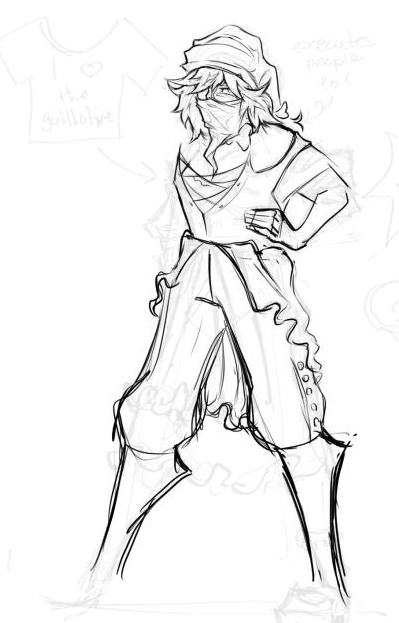
aaand because of that doodle , i researched frev fashion ! and guess what ! that robespierre fashion video came up ! wooo robespierre ! and then this was the first fucking thing i drew of him i cant . I WAS TRYING TO FIGURE OUT HOW THE FUCK HE MISSED SO BAD + HOW THE BULLET WOULD LOOK

BECAUSE after that i drew this ! pookie ! ! !

first saint just drawing . i was listening to angel with a shotgun on loop . . . and i thought . . . angel with a guillotine . . . get it cuz hes . hes angel of the terror . and . and . a

i dont have any explanation for this

i hate this . but first robespierre AND saint just drawing wahoo

first frev oc except the hair on that one drawing is red because i went back and changed it cuz i made their name Jules Le Roux and . You know . Red hair . yeah

jules and calixte ! ! ! calixte is @toastytrusty ' s oc and my sweet sweet little baby i love them dearly

. . . saint just doodle i forgor to come back to

JULES AND CALIXTE LORE

miku binder robespierre

saint just painting robespierres nails because :3

WE INTO THE AMREV NOW WOOO . anyways me when ive married and icarus and hes flown too close to the sun lol ( his wings are meant to be burning letters btw . yeah )

jules , calixte , and leonard interaction ! ! ! ! !

which didnt go well

this turned out gayer than intended i genuinely dont know what happened here

i wanted to continue this so bad but i fucking forgot about it but Uhhh uhhhhh uhhh

you know those vamp ! robespierre and vamp hunter ! saint just aus ? yeah

PLEASE STOP SAYING IT LOOKS LIKE A DICK IVE NEVER DRAWN A VIOLIN BEFORE PLEASE LEAVE HIM ALONE PLEASE PLEASE PLEASE . anyways he playsss theee violinnn he tucks it right underr hisss chinnnnn

winning the idgaf war . unbothered . living his best life

theres a storytime for this drawing but ill save that for later . john adams ( 2008 ) scene redraw but instead of jefferson grabbing adams elbow its his waist except it looks awful and i need to redo it soo baddd

vamp ! robespierre and saint just ( ? ? ? i guess vamp hunter ! saint just cuz thats usually what goes with vamp ! robespierre but idk man ) . they were meant to be on like some moonlit picnic or some shit but then class ended and i forgor about this
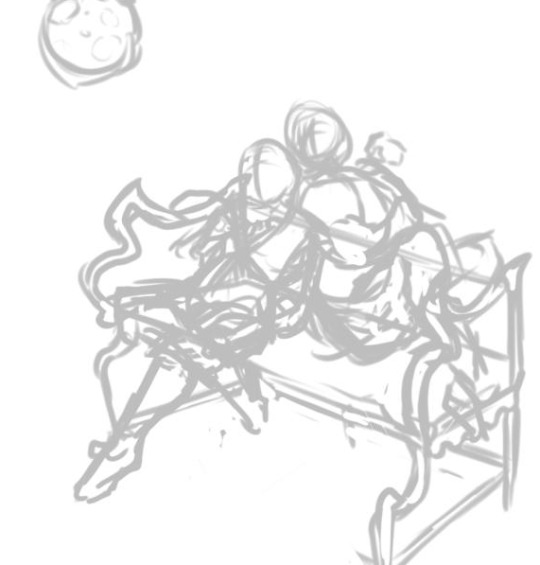
donald trump , alexander hamilton , and thomas jefferson . need i say more ?

the ORIGINAL toxic doomed yaoi ( hamburr )
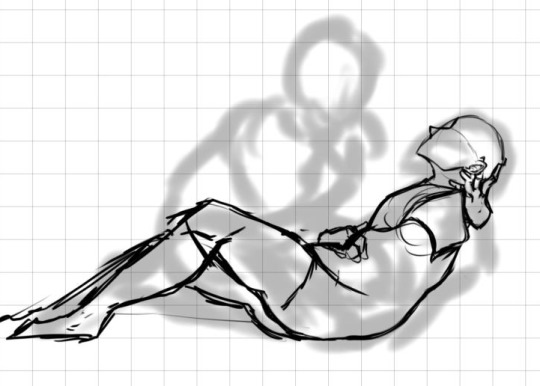
burr . boobies :3

that one scene from saint just et la forces des choses BUT AGAIN this turned out gayer than intended . why do they keep doing this

hey girl i think theres something wrong with your leg

semi modern band ! gay trio . . . thing . . . ? girl idk . but i gave up

making jules a proper ref ! who cheered !

AAAND THATS IT !
let me know if . you want me to finish any of these because otherwise theyre probably going to rot in my gallery HELP
#frev#amrev#art#artists on tumblr#wip#art wip#frev art#amrev art#oc#oc art#good omens#good omens art#technically#cuz the first one was my good omens sona#robespierre#saint just#hamilton#historical hamilton#musical hamilton#jefferson#historical jefferson#1776 jefferson#1776 adams#hes there#hes not refined but hes there#john adams#like the 2008 show#trump#cant believe im tagging that#burr
22 notes
·
View notes
Note
Recently in my history class, we learned a little bit about Robespierre and other stuff around him. We were told that he "had the characteristics of a cult leader", and that he got Danton, Camille and their supporters executed in an effort to stop the terror from being ended. And that he didn't want the terror to end so that he keep his power and position within the CPS. What are your thoughts on this?
ohhh anon sorry if i get long-winded and rambly bc
there's a lot to unpack here
i'll take a look at each of the claims you were told, hope this helps clarify them.
First I should clarify that by "terror" I mean the emergency measures put in place by the convention to get through the crisis. I have to clarify this bc most people think the terror was just guillotining people. Newer history books (and I mean academic ones, not school textbooks) say that calling it "the terror" its inaccurate, but that's more advanced (?) and i dont wanna confuse you with that, so I'll just keep refering it as "terror" from now on.
"had the characteristics of a cult leader"
Which caracteristics? cult leaders claim to be special chosen ones or that they have access to hidden knowledge, they seek to attract and manipulate vulnerable people so they can take advantage of them and demand complete subservience.
Is true Robespierre got an obsessive following that got to weird levels of adoration, but it was more like the parasocial following of celebrities (people get that weird with modern celebrities too). There's no proof that he exploited them economically or physically. Yes, he had an ego like every educated white man from the era, and he had a tendency to self-martyrise in his speeches, but he didn't claim to be special or that he had all the answers. However, it is a common cliché that he sent to the guillotine anyone that disagreed with him, but he didn't have the authority to do that, and he even went out of his way to save political enemies he didn't see as direct threats to the republic (ie, he opposed the arrest of twenty-two (? I think, I always see a different number tbh) girondins in may 1793).
That being said, i see where your teacher is coming from, this is an easy assertion to make if you learn about the festival of the supreme being without the historical context behind it and come to the conclusion that this guy simply made up a religion out of nowhere.
Robespierre was very spiritual and the festival was important to him, but he wasn't the one that proposed it. It was another deputy, Mathieu, that brought a project to the CPS to organize a series of civic festivals consecrated to the supreme being (more on that on Mathiez's fall of Robespierre). Robespierre was in charge of presenting Mathieu's project to the convention and made a speech defending the social utility of a state religion, so the convention approved it. Since he was president of the convention by the time the festival was scheduled, he was the one to precede it, which gave him a lot of visibility that was used against him later. The point is that while he was very invested and attached to the festival, it wasn't something he did out of a whim.
Second, the concept of deism and the supreme being was very old at that point. Both declarations of the rights of men and the constitutions of 1791 and 1793 were consecrated to the supreme being. French revolutionaries in general were influenced by enlightenment ideas about God, which affirms that the universe was created by a supreme being, but rejects organized religion. Robespierre was very religious in this sense, but he still believed in religious liberty, and the point of these civic festivals and decreeing that "the french people acknowledge the existence of the Supreme Being and the immortality of the soul" was to foment religious liberty (idk if they thought of this, but the idea of a Supreme being is so vague, anyone can project whatever God they want into it) and appease the divisions caused by decristianization.
2. he got Danton, Camille and their supporters executed in an effort to stop the terror from being ended
This only makes sense if one believes that Robespierre had complete control of everything that was happening in France at the time. The dantonists' arrest was the work of the committees of public safety and general security in conjunction. I probably should explain how it got to that point, but it's a very long and complicate story and tbh i don't have a full grasp of it myself. It was a chain of events that started with Fabre shenanigans trying to cover his tracks stealing from the liquidation of the east india company and it became a massive mess that ended up with conspiracy charges against a bunch of people including Danton.
Before that, Danton and Desmoulins were advocating for a cease of the terror (and by terror i mean the state of emergency) because they believed that, since the Vendée and federalist revolts had been repressed, it was time to go back to normal, however there still was the external conflict (against all of Europe) in one side, and the Hébertists in another. The hébertists were demanding an increase of the terror and were threatening to overthrow the government if it didn't comply. So, Robespierre thought it wouldn't be wise to end the terror right there.
Robespierre tried to defend them for a while, despite disagreeing with them over stopping the terror, but at some point the evidence against Danton became too much for him to ignore. Whether that evidence proved anything or not it's still up for debate but what matters here is that he and the committees believed it, and at that time there was a lot of paranoia around treason and foreign conspiracy, so what might have been just a case of embezzlement turned into treason etc. But no, Robespierre had hesitated a lot to sign their arrest and when he was arrested himself in 9 thermidor, he was accused of trying to defend Danton AND blamed for his death because this man can never win.
3. he didn't want the terror to end so that he keep his power and position within the CPS
This one's tricky and I'm gonna get subjective/speculative territory because, on one side, I believe he was sick of the terror and there's some "cries for help" that hint of his exhaustion, but he didn't think it should have ended right away when it was the time to end it (with the french victory in the battle of Fleurus). He was mentally deteriorated by the crisis and the conga line of treasons had made him unable to see an end to it, he kept seeing conspiracy and murder plots everywhere. But also by that time he pretty much ghosted the goverment for a month, so whatever he thought about ending the terror or not didn't matter, the goverment kept going with it and using and abusing his prairial law anyway. The goriest period coincides with his absense. You could argue that he still caused it with the prairial law, which I agree, but I think the convention, the committees and the tribunals were equally responsible. Tbh this is a can of worms and historians still fight about it, so i cant give you a definitive answer.
I don't think he would want to stay in a position that had destroyed him physically and emotionally, with people that he hated, to keep power that he didn't have anymore. Being in the CPS didn't even pay well. He said himself in the 8th thermidor speech that he valued his position as a deputy of the convention more than his position in the CPS. I see him quitting soon and staying as far away from the goverment as possible, maybe even from Paris, had he survived... But that's just my personal opinion.
Im so so so sorry for this Bible length post anon, I had many thoughts about it. I don't recommend you to fight your teacher with this info bc I'm not a historian, I'm just some guy online. However, be critical of what you learn in school (assuming it's school, if this is the first time you learn about the frev) bc it simplifies history a lot and the nuances get lost. I know this is a lot of info to take in, I hope I didn't just confuse you further.
#frev#Robespierre#This post is like... Congratulations! or sorry what happened#Genuinely sorry for the length anon
387 notes
·
View notes
Text

Chapter V. Third Period. — Competition.
1. — Necessity of competition.
M. Louis Reybaud, novelist by profession, economist on occasion, breveted by the Academy of Moral and Political
Sciences for his anti-reformatory caricatures, and become, with the lapse of time, one of the writers most hostile to social ideas, — M. Louis Reybaud, whatever he may do, is none the less profoundly imbued with these same ideas: the opposition which he thus exhibits is neither in his heart nor in his mind; it is in the facts.
In the first edition of his “Studies of Contemporary Reformers,” M. Reybaud, moved by the sight of social sufferings as well as the courage of these founders of schools, who believed that they could reform the world by an explosion of sentimentalism, had formally expressed the opinion that the surviving feature of all their systems was ASSOCIATION. M. Dunoyer, one of M. Reybaud’s judges, bore this testimony, the more flattering to M. Reybaud from being slightly ironical in form:
M. Reybaud, who has exposed with so much accuracy and talent, in a book which the French Academy has crowned, the vices of the three principal reformatory systems, holds fast to the principle common to them, which serves as their base, — association. Association in his eyes, he declares, is the greatest problem of modern times. It is called, he says, to solve that of the distribution of the fruits of labor. Though authority can do nothing towards the solution of this problem, association could do everything. M. Reybaud speaks here like a writer of the phalansterian school....
M. Reybaud had advanced a little, as one may see. Endowed with too much good sense and good faith not to perceive the precipice, he soon felt that he was straying, and began a retrograde movement. I do not call this about-face a crime on his part: M. Reybaud is one of those men who cannot justly be held responsible for their metaphors. He had spoken before reflecting, he retracted: what more natural! If the socialists must blame any one, let it be M. Dunoyer, who had prompted M. Reybaud’s recantation by this singular compliment.
M. Dunoyer was not slow in perceiving that his words had not fallen on closed ears. He relates, for the glory of sound principles, that, “in a second edition of the ‘Studies of Reformers,’ M. Reybaud has himself tempered the absolute tone of his expressions. He has said, instead of could do everything, could do much.”
It was an important modification, as M. Dunoyer brought clearly to his notice, but it still permitted M. Reybaud to write at the same time:
These symptoms are grave; they may be considered as prophecies of a confused organization, in which labor would seek an equilibrium and a regularity which it now lacks.... At the bottom of all these efforts is hidden a principle, association, which it would be wrong to condemn on the strength of irregular manifestations.
Finally M. Reybaud has loudly declared himself a partisan of competition, which means that he has decidedly abandoned the principle of association. For if by association we are to understand only the forms of partnership fixed by the commercial code, the philosophy of which has been summarized for us by MM. Troplong and Delangle, it is no longer worth while to distinguish between socialists and economists, between one party which seeks association and another which maintains that association exists.
Let no one imagine, because M. Reybaud has happened to say heedlessly yes and no to a question of which he does not seem to have yet formed a clear idea, that I class him among those speculators of socialism, who, after having launched a hoax into the world, begin immediately to make their retreat, under the pretext that, the idea now belonging to the public domain, there is nothing more for them to do but to leave it to make its way. M. Reybaud, in my opinion, belongs rather to the category of dupes, which includes in its bosom so many honest people and people of so much brains. M. Reybaud will remain, then, in my eyes, the vir probus dicendi peritus, the conscientious and skilful writer, who may easily be caught napping, but who never expresses anything that he does not see or feel. Moreover, M. Reybaud, once placed on the ground of economic ideas, would find the more difficulty in being consistent with himself because of the clearness of his mind and the accuracy of his reasoning. I am going to make this curious experiment under the reader’s eyes.
If I could be understood by M. Reybaud, I would say to him: Take your stand in favor of competition, you will be wrong; take your stand against competition, still you will be wrong: which signifies that you will always be right. After that, if, convinced that you have not erred either in the first edition of your book or in the fourth, you should succeed in formulating your sentiment in an intelligible manner, I will look upon you as an economist of as great genius as Turgot and A. Smith; but I warn you that then you will resemble the latter, of whom you doubtless know little; you will be a believer in equality. Do you accept the wager?
To better prepare M. Reybaud for this sort of reconciliation with himself, let us show him first that this versatility of judgment, for which anybody else in my place would reproach him with insulting bitterness, is a treason, not on the part of the writer, but on the part of the facts of which he has made himself the interpreter.
In March, 1844, M. Reybaud published on oleaginous seeds — a subject which interested the city of Marseilles, his birthplace — an article in which he took vigorous ground in favor of free competition and the oil of sesame. According to the facts gathered by the author, which seem authentic, sesame would yield from forty-five to forty-six per cent of oil, while the poppy and the colza yield only twenty-five to thirty per cent, and the olive simply twenty to twenty-two. Sesame, for this reason, is disliked by the northern manufacturers, who have asked and obtained its prohibition. Nevertheless the English are on the watch, ready to take possession of this valuable branch of commerce. Let them prohibit the seed, says M. Reybaud, the oil will reach us mixed, in soap, or in some other way: we shall have lost the profit of manufacture. Moreover, the interest of our marine service requires the protection of this trade; it is a matter of no less than forty thousand casks of seed, which implies a maritime outfit of three hundred vessels and three thousand sailors.
These facts are conclusive: forty-five per cent. of oil instead of twenty-five; in quality superior to all the oils of France; reduction in the price of an article of prime necessity; a saving to consumers; three hundred ships, three thousand sailors, — such would be the value to us of liberty of commerce. Therefore, long live competition and sesame!
Then, in order to better assure these brilliant results, M. Reybaud, impelled by his patriotism and going straight in pursuit of his idea, observes — very judiciously in our opinion — that the government should abstain henceforth from all treaties of reciprocity in the matter of transportation: he asks that French vessels may carry the imports as well as the exports of French commerce.
“What we call reciprocity,” he says, “is a pure fiction, the advantage of which is reaped by whichever of the parties can furnish navigation at the smallest expense. Now, as in France the elements of navigation, such as the purchase of the ships, the wages of the crews, and the costs of outfit, rise to an excessive figure, higher than in any of the other maritime nations, it follows that every reciprocity treaty is equivalent on our part to a treaty of abdication, and that, instead of agreeing to an act of mutual convenience, we resign ourselves, knowingly or involuntarily, to a sacrifice.”
And M. Reybaud then points out the disastrous consequences of reciprocity:
France consumes five hundred thousand bales of cotton, and the Americans land them on our wharves; she uses enormous quantities of coal, and the English do the carrying thereof; the Swedes and Norwegians deliver to us themselves their iron and wood; the Dutch, their cheeses; the Russians, their hemp and wheat; the Genoese, their rice; the Spaniards, their oils; the Sicilians, their sulphur; the Greeks and Armenians, all the commodities of the Mediterranean and Black seas.”
Evidently such a state of things is intolerable, for it ends in rendering our merchant marine useless. Let us hasten back, then, into our ship yards, from which the cheapness of foreign navigation tends to exclude us. Let us close our doors to foreign vessels, or at least let us burden them with a heavy tax. Therefore, down with competition and rival marines!
Does M. Reybaud begin to understand that his economico-socialistic oscillations are much more innocent than he would have believed? What gratitude he owes me for having quieted his conscience, which perhaps was becoming alarmed!
The reciprocity of which M. Reybaud so bitterly complains is only a form of commercial liberty. Grant full and entire liberty of trade, and our flag is driven from the surface of the seas, as our oils would be from the continent. Therefore we shall pay dearer for our oil, if we insist on making it ourselves; dearer for our colonial products, if we wish to carry them ourselves. To secure cheapness it would be necessary, after having abandoned our oils, to abandon our marine: as well abandon straightway our cloths, our linens, our calicoes, our iron products, and then, as an isolated industry necessarily costs too much, our wines, our grains, our forage! Whichever course you may choose, privilege or liberty, you arrive at the impossible, at the absurd.
Undoubtedly there exists a principle of reconciliation; but, unless it be utterly despotic, it must be derived from a law superior to liberty itself: now, it is this law which no one has yet defined, and which I ask of the economists, if they really are masters of their science. For I cannot consider him a savant who, with the greatest sincerity and all the wit in the world, preaches by turns, fifteen lines apart, liberty and monopoly.
Is it not immediately and intuitively evident that COMPETITION DESTROYS COMPETITION? Is there a theorem in geometry more certain, more peremptory, than that? How then, upon what conditions, in what sense, can a principle which is its own denial enter into science? How can it become an organic law of society? If competition is necessary; if, as the school says, it is a postulate of production, — how does it become so devastating in its effects? And if its most certain effect is to ruin those whom it incites, how does it become useful? For the inconveniences which follow in its train, like the good which it procures, are not accidents arising from the work of man: both follow logically from the principle, and subsist by the same title and face to face.
And, in the first place, competition is as essential to labor as division, since it is division itself returning in another form, or rather, raised to its second power; division, I say, no longer, as in the first period of economic evolution, adequate to collective force, and consequently absorbing the personality of the laborer in the workshop, but giving birth to liberty by making each subdivision of labor a sort of sovereignty in which man stands in all his power and independence. Competition, in a word, is liberty in division and in all the divided parts: beginning with the most comprehensive functions, it tends toward its realization even in the inferior operations of parcellaire labor.
Here the communists raise an objection. It is necessary, they say, in all things, to distinguish between use and abuse. There is a useful, praiseworthy, moral competition, a competition which enlarges the heart and the mind, a noble and generous competition, — it is emulation; and why should not this emulation have for its object the advantage of all? There is another competition, pernicious, immoral, unsocial, a jealous competition which hates and which kills, — it is egoism.
So says communism; so expressed itself, nearly a year ago, in its social profession of faith, the journal, “La Reforme.”
Whatever reluctance I may feel to oppose men whose ideas are at bottom my own, I cannot accept such dialectics. “La Reforme,” in believing that it could reconcile everything by a distinction more grammatical than real, has made use, without suspecting it, of the golden mean, — that is, of the worst sort of diplomacy. Its argument is exactly the same as that of M. Rossi in regard to the division of labor: it consists in setting competition and morality against each other, in order to limit them by each other, as M. Rossi pretended to arrest and restrict economic inductions by morality, cutting here, lopping there, to suit the need and the occasion. I have refuted M. Rossi by asking him this simple question: How can science be in disagreement with itself, the science of wealth with the science of duty? Likewise I ask the communists: How can a principle whose development is clearly useful be at the same time pernicious?
They say: emulation is not competition. I note, in the first place, that this pretended distinction bears only on the divergent effects of the principle, which leads one to suppose that there were two principles which had been confounded. Emulation is nothing but competition itself; and, since they have thrown themselves into abstractions, I willingly plunge in also. There is no emulation without an object, just as there is no passional initiative without an object; and as the object of every passion is necessarily analogous to the passion itself, — woman to the lover, power to the ambitious, gold to the miser, a crown to the poet, — so the object of industrial emulation is necessarily profit.
No, rejoins the communist, the laborer’s object of emulation should be general utility, fraternity, love.
But society itself, since, instead of stopping at the individual man, who is in question at this moment, they wish to attend only to the collective man, — society, I say, labors only with a view to wealth; comfort, happiness, is its only object. Why, then, should that which is true of society not be true of the individual also, since, after all, society is man and entire humanity lives in each man? Why substitute for the immediate object of emulation, which in industry is personal welfare, that far-away and almost metaphysical motive called general welfare, especially when the latter is nothing without the former and can result only from the former?
Communists, in general, build up a strange illusion: fanatics on the subject of power, they expect to secure through a central force, and in the special case in question, through collective wealth, by a sort of reversion, the welfare of the laborer who has created this wealth: as if the individual came into existence after society, instead of society after the individual. For that matter, this is not the only case in which we shall see the socialists unconsciously dominated by the traditions of the regime against which they protest.
But what need of insisting? From the moment that the communist changes the name of things, vera rerum vocabala, he tacitly admits his powerlessness, and puts himself out of the question. That is why my sole reply to him shall be: In denying competition, you abandon the thesis; henceforth you have no place in the discussion. Some other time we will inquire how far man should sacrifice himself in the interest of all: for the moment the question is the solution of the problem of competition, — that is, the reconciliation of the highest satisfaction of egoism with social necessities; spare us your moralities.
Competition is necessary to the constitution of value, — that is, to the very principle of distribution, and consequently to the advent of equality. As long as a product is supplied only by a single manufacturer, its real value remains a mystery, either through the producer’s misrepresentation or through his neglect or inability to reduce the cost of production to its extreme limit. Thus the privilege of production is a real loss to society, and publicity of industry, like competition between laborers, a necessity. All the utopias ever imagined or imaginable cannot escape this law.
Certainly I do not care to deny that labor and wages can and should be guaranteed; I even entertain the hope that the time of such guarantee is not far off: but I maintain that a guarantee of wages is impossible without an exact knowledge of value, and that this value can be discovered only by competition, not at all by communistic institutions or by popular decree. For in this there is something more powerful than the will of the legislator and of citizens, — namely, the absolute impossibility that man should do his duty after finding himself relieved of all responsibility to himself: now, responsibility to self, in the matter of labor, necessarily implies competition with others. Ordain that, beginning January 1, 1847, labor and wages are guaranteed to all: immediately an immense relaxation will succeed the extreme tension to which industry is now subjected; real value will fall rapidly below nominal value; metallic money, in spite of its effigy and stamp, will experience the fate of the assignats; the merchant will ask more and give less; and we shall find ourselves in a still lower circle in the hell of misery in which competition is only the third turn.
Even were I to admit, with some socialists, that the attractiveness of labor may some day serve as food for emulation without any hidden thought of profit, of what utility could this utopia be in the phase which we are studying? We are yet only in the third period of economic evolution, in the third age of the constitution of labor, — that is, in a period when it is impossible for labor to be attractive. For the attractiveness of labor can result only from a high degree of physical, moral, and intellectual development of the laborer. Now, this development itself, this education of humanity by industry, is precisely the object of which we are in pursuit through the contradictions of social economy. How, then, could the attractiveness of labor serve us as a principle and lever, when it is still our object and our end?
But, if it is unquestionable that labor, as the highest manifestation of life, intelligence, and liberty, carries with it its own attractiveness, I deny that this attractiveness can ever be wholly separated from the motive of utility, and consequently from a return of egoism; I deny, I say, labor for labor, just as I deny style for style, love for love, art for art. Style for style has produced in these days hasty literature and thoughtless improvisation; love for love leads to unnatural vice, onanism, and prostitution; art for art ends in Chinese knick-knacks, caricature, the worship of the ugly. When man no longer looks to labor for anything but the pleasure of exercise, he soon ceases to labor, he plays. History is full of facts which attest this degradation. The games of Greece, Isthmian, Olympic, Pythian, Nemean, exercises of a society which produced everything by its slaves; the life of the Spartans and the ancient Cretans, their models; the gymnasiums, playgrounds, horse-races, and disorders of the market-place among the Athenians; the occupations which Plato assigns to the warriors in his Republic, and which but represent the tastes of his century; finally, in our feudal society, the tilts and tourneys, — all these inventions, as well as many others which I pass in silence, from the game of chess, invented, it is said, at the siege of Troy by Palamedes, to the cards illustrated for Charles VI. by Gringonneur, are examples of what labor becomes as soon as the serious motive of utility is separated from it. Labor, real labor, that which produces wealth and gives knowledge, has too much need of regularity and perseverance and sacrifice to be long the friend of passion, fugitive in its nature, inconstant, and disorderly; it is something too elevated, too ideal, too philosophical, to become exclusively pleasure and enjoyment, — that is, mysticism and sentiment. The faculty of laboring, which distinguishes man from the brutes, has its source in the profoundest depths of the reason: how could it become in us a simple manifestation of life, a voluptuous act of our feeling?
But if now they fall back upon the hypothesis of a transformation of our nature, unprecedented in history, and of which there has been nothing so far that could have expressed the idea, it is nothing more than a dream, unintelligible even to those who defend it, an inversion of progress, a contradiction given to the most certain laws of economic science; and my only reply is to exclude it from the discussion.
Let us stay in the realm of facts, since facts alone have a meaning and can aid us. The French Revolution was effected for industrial liberty as well as for political liberty: and although France in 1789 had not seen all the consequences of the principle for the realization of which she asked, — let us say it boldly, — she was mistaken neither in her wishes nor in her expectation. Whoever would try to deny it would lose in my eyes the right to criticism: I will never dispute with an adversary who would posit as a principle the spontaneous error of twenty-five millions of men.
At the end of the eighteenth century France, wearied with privileges, desired at any price to shake off the torpor of her corporations, and restore the dignity of the laborer by conferring liberty upon him. Everywhere it was necessary to emancipate labor, stimulate genius, and render the manufacturer responsible by arousing a thousand competitors and loading upon him alone the consequences of his indolence, ignorance, and insincerity. Before ’89 France was ripe for the transition; it was Turgot who had the glory of effecting the first passage.
Why then, if competition had not been a principle of social economy, a decree of destiny, a necessity of the human soul, why, instead of abolishing corporations, masterships, and wardenships, did they not think rather of repairing them all? Why, instead of a revolution, did they not content themselves with a reform? Why this negation, if a modification was sufficient? Especially as this middle party was entirely in the line of conservative ideas, which the bourgeoisie shared. Let communism, let quasi-socialistic democracy, which, in regard to the principle of competition, represent — though they do not suspect it — the system of the golden mean, the counter-revolutionary idea, explain to me this unanimity of the nation, if they can!
Moreover the event confirmed the theory. Beginning with the Turgot ministry, an increase of activity and well-being manifested itself in the nation. The test seemed so decisive that it obtained the approval of all legislatures. Liberty of industry and commerce figure in our constitutions on a level with political liberty. To this liberty, in short, France owes the growth of her wealth during the last sixty years.
After this capital fact, which establishes so triumphantly the necessity of competition, I ask permission to cite three or four others, which, being less general in their nature, will throw into bolder relief the influence of the principle which I defend.
Why is our agriculture so prodigiously backward? How is it that routine and barbarism still hover, in so many localities, over the most important branch of national labor? Among the numerous causes that could be cited, I see, in the front rank, the absence of competition. The peasants fight over strips of ground; they compete with each other before the notary; in the fields, no. And speak to them of emulation, of the public good, and with what amazement you fill them! Let the king, they say (to them the king is synonymous with the State, with the public good, with society), let the king attend to his business, and we will attend to ours! Such is their philosophy and their patriotism. Ah! if the king could excite competition with them! Unfortunately it is impossible. While in manufactures competition follows from liberty and property, in agriculture liberty and property are a direct obstacle to competition. The peasant, rewarded, not according to his labor and intelligence, but according to the quality of the land and the caprice of God, aims, in cultivating, to pay the lowest possible wages and to make the least possible advance outlays. Sure of always finding a market for his goods, he is much more solicitous about reducing his expenses than about improving the soil and the quality of its products. He sows, and Providence does the rest. The only sort of competition known to the agricultural class is that of rents; and it cannot be denied that in France, and for instance in Beauce, it has led to useful results. But as the principle of this competition takes effect only at second hand, so to speak, as it does not emanate directly from the liberty and property of the cultivators, it disappears with the cause that produces it, so that, to insure the decline of agricultural industry in many localities, or at least to arrest its progress, perhaps it would suffice to make the farmers proprietors.
Another branch of collective labor, which of late years has given rise to sharp debates, is that of public works. “To manage the building of a road, M. Dunoyer very well says, “perhaps a pioneer and a postilion would be better than an engineer fresh from the School of Roads and Bridges.” There is no one who has not had occasion to verify the correctness of this remark.
On one of our finest rivers, celebrated by the importance of its navigation, a bridge was being built. From the beginning of the work the rivermen had seen that the arches would be much too low to allow the circulation of boats at times when the river was high: they pointed this out to the engineer in charge of the work. Bridges, answered the latter with superb dignity, are made for those who pass over, not for those who pass under. The remark has become a proverb in that vicinity. But, as it is impossible for stupidity to prevail forever, the government has felt the necessity of revising the work of its agent, and as I write the arches of the bridge are being raised. Does any one believe that, if the merchants interested in the course of the navigable way had been charged with the enterprise at their own risk and peril, they would have had to do their work twice? One could fill a book with masterpieces of the same sort achieved by young men learned in roads and bridges, who, scarcely out of school and given life positions, are no longer stimulated by competition.
In proof of the industrial capacity of the State, and consequently of the possibility of abolishing competition altogether, they cite the administration of the tobacco industry. There, they say, is no adulteration, no litigation, no bankruptcy, no misery. The condition of the workmen, adequately paid, instructed, sermonized, moralized, and assured of a retiring pension accumulated by their savings, is incomparably superior to that of the immense majority of workmen engaged in free industry.
All this may be true: for my part, I am ignorant on the subject. I know nothing of what goes on in the administration of the tobacco factories; I have procured no information either from the directors or the workmen, and I have no need of any. How much does the tobacco sold by the administration cost? How much is it worth? You can answer the first of these questions: you only need to call at the first tobacco shop you see. But you can tell me nothing about the second, because you have no standard of comparison and are forbidden to verify by experiment the items of cost of administration, which it is consequently impossible to accept. Therefore the tobacco business, made into a monopoly, necessarily costs society more than it brings in; it is an industry which, instead of subsisting by its own product, lives by subsidies, and which consequently, far from furnishing us a model, is one of the first abuses which reform should strike down.
And when I speak of the reform to be introduced in the production of tobacco, I do not refer simply to the enormous tax which triples or quadruples the value of this product; neither do I refer to the hierarchical organization of its employees, some of whom by their salaries are made aristocrats as expensive as they are useless, while others, hopeless receivers of petty wages, are kept forever in the situation of subalterns. I do not even speak of the privilege of the tobacco shops and the whole world of parasites which they support: I have particularly in view the useful labor, the labor of the workmen. From the very fact that the administration’s workman has no competitors and is interested neither in profit nor loss, from the fact that he is not free, in a word, his product is necessarily less, and his service too expensive. This being so, let them say that the government treats its employees well and looks out for their comfort: what wonder? Why do not people see that liberty bears the burdens of privilege, and that, if, by some impossibility, all industries were to be treated like the tobacco industry, the source of subsidies failing, the nation could no longer balance its receipts and its expenses, and the State would become a bankrupt?
Foreign products: I cite the testimony of an educated man, though not a political economist, — M. Liebig.
Formerly France imported from Spain every year soda to the value of twenty or thirty millions of francs; for Spanish soda was the best. All through the war with England the price of soda, and consequently that of soap and glass, constantly rose. French manufacturers therefore had to suffer considerably from this state of things. Then it was that Leblanc discovered the method of extracting soda from common salt. This process was a source of wealth to France; the manufacture of soda acquired extraordinary proportions; but neither Leblanc nor Napoleon enjoyed the profit of the invention. The Restoration, which took advantage of the wrath of the people against the author of the continental blockade, refused to pay the debt of the emperor, whose promises had led to Leblanc’s discoveries....
A few years ago, the king of Naples having undertaken to convert the Sicilian sulphur trade into a monopoly, England, which consumes an immense quantity of this sulphur, warned the king of Naples that, if the monopoly were maintained, it would be considered a casus belli. While the two governments were exchanging diplomatic notes, fifteen patents were taken out in England for the extraction of sulphuric acid from the limestones, iron pyrites, and other mineral substances in which England abounds. But the affair being arranged with the king of Naples, nothing came of these exploitations: it was simply established, by the attempts which were made, that the extraction of sulphuric acid by the new processes could have been carried on successfully, which perhaps would have annihilated Sicily’s sulphur trade.
Had it not been for the war with England, had not the king of Naples had a fancy for monopoly, it would have been a long time before any one in France would have thought of extracting soda from sea salt, or any one in England of getting sulphuric acid from the mountains of lime and pyrites which she contains. Now, that is precisely the effect of competition upon industry. Man rouses from his idleness only when want fills him with anxiety; and the surest way to extinguish his genius is to deliver him from all solicitude and take away from him the hope of profit and of the social distinction which results from it, by creating around him peace everywhere, peace always, and transferring to the State the responsibility of his inertia.
Yes, it must be admitted, in spite of modern quietism, — man’s life is a permanent war, war with want, war with nature, war with his fellows, and consequently war with himself. The theory of a peaceful equality, founded on fraternity and sacrifice, is only a counterfeit of the Catholic doctrine of renunciation of the goods and pleasures of this world, the principle of beggary, the panegyric of misery. Man may love his fellow well enough to die for him; he does not love him well enough to work for him.
To the theory of sacrifice, which we have just refuted in fact and in right, the adversaries of competition add another, which is just the opposite of the first: for it is a law of the mind that, when it does not know the truth, which is its point of equilibrium, it oscillates between two contradictions. This new theory of anti-competitive socialism is that of encouragements.
What more social, more progressive in appearance, than encouragement of labor and of industry? There is no democrat who does not consider it one of the finest attributes of power, no utopian theorist who does not place it in the front rank as a means of organizing happiness. Now, government is by nature so incapable of directing labor that every reward bestowed by it is a veritable larceny from the common treasury. M. Reybaud shall furnish us the text of this induction.
“The premiums granted to encourage exportation,” observes M. Reybaud somewhere, “are equivalent to the taxes paid for the importation of raw material; the advantage remains absolutely null, and serves to encourage nothing but a vast system of smuggling.”
This result is inevitable. Abolish customs duties, and national industry suffers, as we have already seen in the case of sesame; maintain the duties without granting premiums for exportation, and national commerce will be beaten in foreign markets. To obviate this difficulty do you resort to premiums? You but restore with one hand what you have received with the other, and you provoke fraud, the last result, the caput mortuum, of all encouragements of industry. Hence it follows that every encouragement to labor, every reward bestowed upon industry, beyond the natural price of its product, is a gratuitous gift, a bribe taken out of the consumer and offered in his name to a favorite of power, in exchange for zero, for nothing. To encourage industry, then, is synonymous at bottom with encouraging idleness: it is one of the forms of swindling.
In the interest of our navy the government had thought it best to grant to outfitters of transport-ships a premium for every man employed on their vessels. Now, I continue to quote M. Reybaud:
On every vessel that starts for Newfoundland from sixty to seventy men embark. Of this number twelve are sailors: the balance consists of villagers snatched from their work in the fields, who, engaged as day laborers for the preparation of fish, remain strangers to the rigging, and have nothing that is marine about them except their feet and stomach. Nevertheless, these men figure on the rolls of the naval inscription, and there perpetuate a deception. When there is occasion to defend the institution of premiums, these are cited in its favor; they swell the numbers and contribute to success.
Base jugglery! doubtless some innocent reformer will exclaim. Be it so: but let us analyze the fact, and try to disengage the general idea to be found therein.
In principle the only encouragement to labor that science can admit is profit. For, if labor cannot find its reward in its own product, very far from encouraging it, it should be abandoned as soon as possible, and, if this same labor results in a net product, it is absurd to add to this net product a gratuitous gift, and thus overrate the value of the service. Applying this principle, I say then: If the merchant service calls only for ten thousand sailors, it should not be asked to support fifteen thousand; the shortest course for the government is to put five thousand conscripts on State vessels, and send them on their expeditions, like princes. Every encouragement offered to the merchant marine is a direct invitation to fraud, — what do I say? — a proposal to pay wages for an impossible service. Do the handling and discipline of vessels and all the conditions of maritime commerce accommodate themselves to these adjuncts of a useless persononel? What, then, can the ship-owner do in face of a government which offers him a bonus to embark on his vessel people of whom he has no need? If the ministry throws the money of the treasury into the street, am I guilty if I pick it up?
Thus — and it is a point worthy of notice — the theory of encouragements emanates directly from the theory of sacrifice; and, in order to avoid holding man responsible, the opponents of competition, by the fatal contradiction of their ideas, are obliged to make him now a god, now a brute. And then they are astonished that society is not moved by their appeal! Poor children! men will never be better or worse than you see them now and than they always have been. As soon as their individual welfare solicits them, they desert the general welfare: in which I find them, if not honorable, at least worthy of excuse. It is your fault if you now demand of them more than they owe you and now stimulate their greed with rewards which they do not deserve. Man has nothing more precious than himself, and consequently no other law than his responsibility. The theory of self-sacrifice, like that of rewards, is a theory of rogues, subversive of society and morality; and by the very fact that you look either to sacrifice or to privilege for the maintenance of order, you create a new antagonism in society. Instead of causing the birth of harmony from the free activity of persons, you render the individual and the State strangers to each other; in commanding union, you breathe discord.
To sum up, outside of competition there remains but this alternative, — encouragement, which is a mystification, or sacrifice, which is hypocrisy.
Therefore competition, analyzed in its principle, is an inspiration of justice; and yet we shall see that competition, in its results, is unjust.
#organization#revolution#anarchism#daily posts#communism#anti capitalist#anti capitalism#late stage capitalism#anarchy#anarchists#libraries#leftism#social issues#economy#economics#climate change#anarchy works#environmentalism#environment#solarpunk#anti colonialism#mutual aid#the system of economic contradictions#the philosophy of poverty#volume i#pierre-joseph proudhon#pierre joseph proudhon
15 notes
·
View notes
Text
Operation Matador: Wolf Killer Lestat

@blueiight FACTS! Lestat represents everything both he & Louis claimed they hated, but secretly admired/envied. Lestat lives for the aesthetic--he grew up just as slovenly and broke as any peasant, in the marquis' crumbling chateau, embarrassed about his brothers' rough manners throwing bones to the dogs at the dinner table & such.
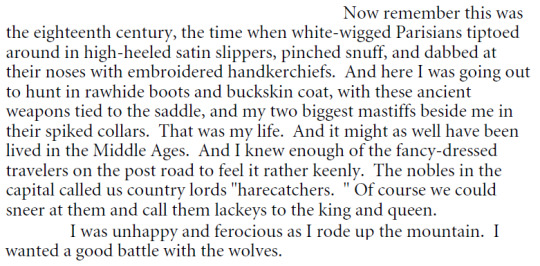
For all Lestat's talk about being the rugged hunter, the Wolf Killer, the first chance he got he booked it to Paris to act the dandy Lelio. He HATED his family, and he admired/envied the lifestyles of the rich & fabulous. Part of why dandies act so flamboyant is because they're putting on airs--an emulation/exaggeration of what they thought the nobility/genteel acted like. The bourgeoisie/nouveau riche/lower & middle class all wanted to be JUST like the aristocratic elite--and the Reign of Terror showed how they became the monsters they were trying to kill. "I wanted to murder the man; I wanted to BE the man." Vicious cycles.



@likethemodel you keep doing this to me--STOP. 😵💫The Wolf Killer's red velvet cloak and the Bull Killer's red flag/cape, DANG.


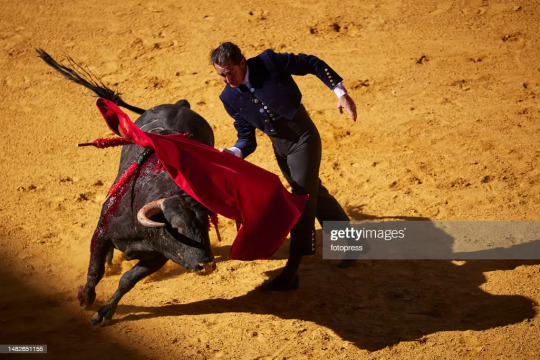


Lestat got the prized wolf fur cloak, and matadors are awarded the bull's ears (orejas) and tail (rabo) if they perform exceptionally well during the fight. Lestat's family ate the wolf meat, and after bullfights the bulls are sent to the slaughterhouse and sold as beef. THE PARALLELS commemorating BLOODY victory.

@dirhwangdaseul And what's BANANAS is that Lestat is just as controversial as bullfighting itself. Their violence is not all/inherently bad, it's just whether one chooses to see it in a good/bad/neutral light. IWTV (i.e.: Louis & Claudia) is focused on making Lestat look bad. For Louis/Claudia, the "villain sequence" in Ep5 highlights how Lestat (dressed as The Killer (matador in Spanish)) is just like Akasha said in QotD: "so perfectly what is wrong with all things male." But that's not the WHOLE story, that's not ALL of what Lestat is, even though YES, when AR first wrote about him she was speaking from a place of pain & grief & anger about her own life. A decade later, AR had switched gears and gave Lestat his own perspective, as there's 2 sides to every story. In TVL he's FAR more sympathetic, and we see The Killer in a far more nuanced light, described best by Gabrielle (a la a mother's love).

Lestat LOVES Louis & Claudia. But by Ep5 things had gotten so dang BAD that he succumbed to his worst impulses ("my father's temper"), taking upon himself "the burden of murder or madness to be free of this place." Just like the tragedy of Louis was that he was weak/cowardly; Lestat's tragedy is that he's strong/impulsive--he's always been "stronger than anyone else." He's Hercules, killing his wife & children in a fit of madness thinking they were a pack of lions. But the beast was INSIDE Lestat all along. It's classic Gothic Horror.

@blueiight ALL OF THIS, yup! NGL I think Lestat's endless wealth made him an acceptable relic--his privilege saved him from being treated just like Paul. (Like, Paul acting up in public was only tolerated because of the money Louis kept pumping into the neighborhood (the church donations, those storefronts, etc), that made the DPDLs so respected.) There's a lot being telegraphed by Mr Bouillabaisse de Lioncourt partially because he's SO old that he's out of touch with modernity (I NEED to know if he was asleep before NOLA Rolin, PLEASE 🙏); partially because he's foreign and "there's things you don't get about America, Lestat;" and partially because he's white and he has no clue about the rich nuances of black culture until Louis educates him. (And even then Lestat insists he knows best--one-upping Jelly Roll Morton to create the Wolverine Blues (a la white people claiming blues/jazz/rock & roll Monsieur le Rockstar); whitesplaining about the race riots; etc...). And it's beyond hysterical that Louis was like "he ain't white, he's French," like SIR. 🤦 You of all people should be well-read enough about your own city, Mr. Heads on a Pike in Jackson Square, to know French Whites were the big bad wolves of NOLA's history--not to mention French imperialism across Africa & the Caribbean & Asia. 💀 (He's so lost in the sauce, bless his heart.) But Louis doesn't REALLY know Lestat, is the kicker.


@demonicdomarmand Soooooo multilayered. It's 100% satire @blueiight, agreed. Like, there's the IRL history of Mardi Gras flouting social/class hierarchies (turning everything upside down a la the Saturnalia); how Lestat plays into queer history through gender & drag; the Louis vs Antoinette of it all with the let them eat cake and French history; then they wrap it all up in a direct nod to vamps/demons accused of stealing/killing kids.


DIABOLICAL, AMC, please keep going.

@nalyra-dreaming Show of the Decade! <3 IWTV has the best allegorical handling of vampirism I've ever seen, but folks wanna complain about raceswaps & Claudia's age & them not being on a plantation anymore, like HUH?

@greedydemands I'm not LOL. Just living online and talking to all y'all teaches me more than I ever got in school.

@thebarnburn LOL I'm a student, just proctoring--DR. CAROL CUTSHALL is out here with TENURE. 🍎 It's a effing crime the Emmy's snubbed IWTV--if we don't get some roses come S2 the fix is in, officially, cuz their attention to detail has been downright disgusting.
#interview with the vampire#the vampire lestat#loustat#fashion statement#fashion history#operation matador#justice for claudia
27 notes
·
View notes
Note
Considering vampires are eternal, the Cullens could actually have come from any place/time period, so assuming Carlisle is actually 700 years old, what time would all the Cullens have come from? And which country? Would you change their physical age too?
If we're making Carlisle that old, then the logical thing to me is place him during the Black Death, since in his own canon time period there was another, although less severe, outbreak of the plague. So he was maybe born 1325ish and then was turned in 1348ish while the plague was ravaging London. In the old folklore, vampires were associated with disease, so you could tie that in somehow too: that his father thought hunting the vampires would end the outbreak or whatever.
Esme's name always seemed very French to me, so I'd probably move her origin to France if we had more time to work with (might be spelled Esmée though if she is legitimately French). I might make her a few years older so she's more believable as an adoptive mother.
But Edward has to be there first. Let's give Edward Carlisle's original slot of Cromwellian/Restoration England! Honestly his spiritual hang-ups would make way more sense with that background than it does for an upper middle class lawyer's kid from Chicago. Yes, actually, hold on, this is making total sense! Edward and his mother Elizabeth are dying of the 1665 plague in London; and things play out as they did in 1918 Chicago. Yes. Perfect.
They then go to France and add Esme/Esmée to the family (maybe Carlisle met her earlier working or studying in France) in the late 1600s, early 1700s.
Then eventually they go to the USA, either before or after it becomes a country. I think the others would still be Americans. Maybe Rosalie is from the revolutionary era; yes, actually, and Emmett too because they were the same age, and so Emmett and Garrett would be extra close bros being from the same time period. There can still be the social class and geographic differences between Emmett and Rosalie.
I still like the 1920s vibes with Alice and she feels more 'modern' than the rest, so I might keep that. Jasper could be involved with literally any war and his story would work; Mexican-American war could work if we want to keep Maria as his creator. Otherwise we could give him WWI, since Edward isn't daydreaming about it this time, and he could get caught up in some ancient vampire war in Europe instead.
Bella should stay the same I think; and I think Edward does work better if he's really that much older. And I also think the age gap is somehow less creepy when it's legitimately not possible they could have met as humans. In canon, they were born in 1901 and 1987. He was 86 when she was born; he could have still been alive. But in this version he was born in the 1600s, there is no way they are ever meeting but through supernatural means, it's so farfetched that it removes (for me, at least, your mileage my vary) some of the ick factor.
86 notes
·
View notes
Note
Did you read any good books about how Early Modern Europe became well modern, including emergence of capitalism and transformation of daily life written from a leftist perspective*? I know a book from the cycle of "History of Private Life" (it's originally written in French and I am reading a non-English translation, so idk how it's properly called), but it's focused on private life and idk how leftist it is.
Usually all honest history is somewhat leftist**, but like, honest.
(*I don't care about specifics of different schools of thought I am looking for inspiration for TTRPG campaign)
(**By this I mean that to not say total bullshit you need to deal with the fact that people are not equal, and the inequality in question is not about merit but about wealth and authority. Yes, the historian may think that it's good actually or focus on things that I wouldn't, or use totally bullshit theoretical framework, but you can forage for knowledge here)
P.S.: I am asking you at all because I don't know any leftist blogger who is into history and you mentioned reading "Caliban and the Witch" and generally for whatever reason I have the impression that you may be into it, so yeah. Maybe some of your followers at least knows
Yeah my history degree pretty much only serves me as a source for better tumblr posting so I’m always good for asks on it! I was gonna recommend Caliban and the Witch but saw you mention it at the end lol. A lot of my education on it came from reading bits and pieces of lots of different sources during college, wish I had written more of em down sorry. I was more focused on history outside of Europe as well, had a class focused on the history of environmentalism and industrialism in Europe and the enclosure of the commons but most of my stuff was about the Americas, Africa, the Middle East and Southeast Asia/the pacific. My focus was more on how colonialism is responsible for the jump from feudalism to capitalism
It is something you can get info on from the big names like Marx and Kropotkin and so on, and generally anarchists and maoists focus more on the agrarian. I think Against History, Against Leviathan gets into it a bit but it’s been ages since I’ve read it. Looking into the Levelers and the Diggers would probably find you some good history on that as well.
If anyone following has good recommendations, drop em below as well
9 notes
·
View notes
Note
I'd really love the sci fi reading list, if it's not too difficult! Thank you for your explanation
Yes! Okay, requisite this is Not Authoritative Or Comprehensive claim, I'm a dork with a Russian degree, but here we go:
(I tried to organize this chronologically because if I did it thematically we would be here all day. Also, I still have more books, but they get increasingly niche. This is a Greatest Hits playlist, and if you look these people up, you will find their contemporaries)
(Long list below the Read More)
Jules Verne — 80,000 Leagues Under the Sea, Journey to the Center of the Earth. Excellent continuations of that exploration/'ostracized' genius figure, so popular in the previous century. French, so English translations. Kinda marks the transition point between 19th c. pure spec exploration and what we would call sci-fi. BUT BEFORE HIM...
Mary Shelley — Frankenstein is probably the first sci-fi novel as we know it. BUT BEFORE HER...
Margaret Cavendish — Okay, the 'first sci-fi novel' is hard to define for obvious reasons, but The Blazing World has as good a claim as any. Published in the 17th c., so it really traverses the genres, but includes a utopian kingdom accessible via the North Pole. Her husband was so impressed that he composed a sonnet for her, which serves as the epigraph for the novel; it's a wild read in the same way Robinson Crusoe and other early novels are, and I'm mostly including it here because it's so, so wild to read in 2023.
John W. Campbell — That dude. The hero's journey guy. His short story Who Goes There? Has been adapted a million times into a little movie called The Thing. Unfortunately got really into race science, so Isaac Asimov told him to fuck off. Edited the magazine Astounding Science Fiction, which in 1939 published Black Destroyer by Alfred Van Vogt, usually cited as the beginning of Golden Age sci-fi.
H. G. Wells — Big critic of class divisions in Victorian English society, coined the term 'time machine' as we think of it in his novel...The Time Machine. A lot of what we consider 'classic' time travel tropes were, if not invented here, had their seeds planted here. Also famous for War of the Worlds, leading to a MINOR disturbance when Orson Welles did a dramatic radio reading.
Edgar Rice Burroughs — the man, the myth, the legend. If I could persuade you to read one white English sci-fi author with rather dubious politics, it would be him, if only because of how influential he was. Mostly famous for Tarzan, but he also wrote a whole series about Hollow Earth that crosses over with Tarzan at some point (Pellucidar), as well as the series Barsoom (A Princess of Mars and its sequels), and Amtor (Guy named Carson Napier gets transported to Venus, which was a watery hellscape, as was popularly theorized for a while).
They're basically pulp comics before pulp comics, published in magazines, extremely lurid and dramatic, and he did write his own crossovers. These were what the first modern superhero comics writers often grew up reading and what inspired them—John Carter's cultural cachet was borrowed by Superman until it became his cultural cachet.
They're very fun, but also supremely products of their time, and extremely fond of the British Empire.
Judith Merrill — prolific writer and editor, who also wrote one of my personal favorite reactions to the atomic bomb in Shadow on the Hearth.
Gabriel García Márquez — we're gonna take half a sidestep into magical realism here (which is, to define quickly, a genre incorporating the fantastic into otherwise realistic narratives, often formed and associated with decolonial and post colonial Latin American fiction, but not always. It's a fuzzy genre). He wrote in Spanish, but I read him in English. One Hundred Years of Solitude is probably one of the great novels ever written. My mother is also telling me to rec Love in the Time of Cholera and she wrote about the man, so listen to her.
Jorge Amado — the sixties were the big magical realism heyday. Amado was Brazilian and his Dona Flor and her Two Husbands is a book my Spanish high school teacher made me swear to read some day.
Andre Alice Norton — Deserves a spot for being one of the most prolific sci-fi authors of all time during a time when sci-fi was INCREDIBLY inhospitable to women. Over 300 books!
Robert Heinlein — This man is the poster child for "male author who writes groundbreaking sci-fi novels but cannot be normal about women with a gun to his head". The Moon Is A Harsh Mistress is excellent and incredibly important for how comprehensive the creation of Luna and its workers was, even if it is very sixties free love. Also wrote Starship Troopers, the novel.
Edward Smith — you haven't seen drama until you read what they said when Lensman (first book is Triplanetary) lost to Foundation for the Hugo in the sixties.
Larry Niven — Fleet of Worlds! Ringworld won a whole host of awards and deservedly so in 1970. Fair warning, his stuff decidedly falls under "hard" sci-fi (lots and lots of discussion for plausible alien artifacts), though it is awesome just in terms of how he can communicate scale. If you see a big ring-like structure in space, you can thank this guy, basically (the term ringworld comes from here). Also did a bunch of co-writing. I haven't read his other stuff, but CoDominium is on my list (he co-wrote it. First book is The Mote in God's Eye). If you liked the TV show The Expanse when it did the alien stuff and the later books it never got to adapt, you'll love this guy.
Samuel R. Delaney — Dhalgren is a book I am forbidding you to research before reading. Go in prepared. You have been warned. You will either love this book or set it on fire.
Stanislaw Lem — Solaris. I started this novel last week after watching the Tarkovsky film and. It's doing something to my brain, that's for sure. It's a book where I have to read every sentence twice. If you read it, find a good translation if you don't speak Polish. The author famously is very mad at critics who use Freudian analysis for it, so tread carefully (it's about the limits of rationality and our ability to understand, so. Fair).
Joanna Russ — The Female Man is a seminal work of feminist sci-fi. It's—fascinating, to be honest. Discusses socially enforced dependence of women on men and the creation of a different gender, a "female man", when the protagonist chooses to reject it and thus her socially enforced gender. I wouldn't call it a transgender manifesto (written in 1975, features insufficiently masculine men undergoing sex change surgery, so...yeah) but it definitely awoke something in my brain when I was 16 lol. I would LOVE to see it revisited in literary criticism from a modern perspective, especially from trans people.
C.J. Cherryh — If we talked about female sci-fi authors from the 1950s-70s writing under gender ambiguous aliases, we would be here all day, so I'm picking the one whose books I got for cheap at a book sale. Her Foreigner series has such a good premise with descendants of a lost Earth ship and interstellar court drama, and it's SO fun.
Poul Anderson — the name is not a typo, do not look up Paul Anderson, you will never find him. I actually have a copy of Three Swords and Three Lions currently collecting dust on my shelf and judging me right now as I wait to read it. Tau Zero is one of the greatest things I've ever read. The time dilation stuff gets kinda dense at times, but he incorporates some interest in his Swedish history and folk tales into it, and his explanation of travel at the speed of light and incorporating that into his discussion of nationalism is incredible. The ending where they survived [REDACTED] and landed on what may have been [REDACTED] has been bouncing around my brain for a bit now.
Laura Esquivel — Like Water for Chocolate is from the magical realism reading list.
Salman Rushdie — Midnight's Children is one of those bucket list books, for better or worse. Recontextualized Indian independence from the British and the Partition through framing of a husband telling the story to his wife, as he actively tells the story to her. Really uses the fantastical versus the real w/history versus truth so well.
Nancy Farmer — The Ear, the Eye, and the Arm, for the kids lying about their age on Tumblr dot hell. Three kids try to escape a kidnapping after sneaking out—in 23rd century Zimbabwe. With the help of three mutant detectives. It rules.
Ben Okri — Okay, I have not read his stuff yet, but it is on my list. Other people here have discussed his influence on them in post colonial sci-fi. His big one is The Famished Road, first in a trilogy, and renowned for its discussion of the spiritual and realist world coexisting in African animist spiritual life.
Nnedi Okorafor — I have read one of her short stories, Remote Control, and currently have an book list with her other stuff on it. Other people I know vouched for her work. She specifically writes Africanfuturism and Africanjujuism centered around her Nigerian background, and follows on from the likes of Okri and Octavia Butler. I'd also add if you're a Stephen King fan when he's in Dark Tower mode, she's probably gonna have things that appeal to you.
Mentions that are absolutely influential but don't need explaining on this website: Franz Kafka, Ursula K Le Guin, Douglas Adams, N. K. Jemisin, Ray Bradbury, Arthur C Clarke, Isaac Asimov, Frank Herbert, Alduous Huxley, Philip K. Dick, Orson Scott Card, Kurt Vonnegut, George Orwell, Octavia Butler, Neil Gaiman, Toni Morrison.
(to be clear: you SHOULD read them, but you probably know who most of them are and/or why they're big deals. Most of them are also incredibly prolific, and explaining their bodies of work are other posts. Trying to make a list about other folks)
For more on Afrofuturism,(not to be confused with Africanfuturism), I recommend the shit out of Afrofuturism: The World of Black Sci-Fi and Fantasy Culture, full of short stories and guides to art and music. I, alas, lack similarly useful authoritative guides to other genres, but I have read that one, so wanna toss it out there. There's so much.
10 notes
·
View notes
Text
some stuff i read and watched in november:
taskmaster (s16): what a delight!! what a fucking charming bunch of weirdos, sam campbell somehow everything to me now?? if you think susan wokoma is hot you should watch bbc CHEATERS etc
black swan: first rewatch for ages and it still goes so hard, Love the score, natalie as ever at her best when you can see the gears going in her head, she was perfect!!
the girl with the dragon tattoo: it's been fincher season on blank check, rewatched this for i think the first time since i saw it at the pictures and liked it much more, especially the mara/craig chemistry and all the snow and knitwear etc. it's great when she's like put your hand back in my shirt and he does it
anatomy of a fall: more snow - really liked this - between this and saint omer it's the year of french legal dramas etc. her lawyer with the hair and the chemistry and that other lawyer from 120 bpm!
saltburn: UGH. i'd heard such mixed things and i was actually having fun up until the Turn (although if they're freshers in 2006 they're not the class of 2006 are they emerald) but the ending is So stupid that it made me hate the whole thing lol. imo it's fine to criticise posh people for making shit art!! some of them make interesting art but not emerald fennell!!
the eternal daughter: meanwhile joanna hogg said posh filmmaker rights actually! i loved this, so quiet and haunting and the costumes and the hotel of it all. you can't know your parents really ever!! when i'm old nobody's going to be around to take care of me!! and so like aching as an extension of the souvenir project plus back to the evergreen joanna hogg theme of rich people having an awful time on holiday etc
napoleon: had way too much fun with this, was not prepared for it to be so funny and so full of Guys - paul rhys! tom godwin! sam troughton as robespierre??? mr segundus himself aka edward hogg!!! great year of looking at vanessa kirby's feline face between this and mission impossible. aren't we all just trying to enjoy a succulent breakfast etc
may december: my favourite thing i've seen this year maybe?? natalie and julianne having so much fun with like the monstrous performance mirrors meanwhile charles melton's performance is entirely heartbreaking?? so deeply deeply sad and moving?? goddamn todd haynes
yentl: every talks about how hot young mandy patinkin is in yentl and yet i was Entirely unprepared my god
miami vice: loved this!!! like yes it's mumble city and who knows what's going on but colin farrell and gong li going to havana in a go fast boat to drink mojitos and dance salsa and fall in love??? it's digital cinema and it's very tender!!! brb listening to numb/encore again etc
robert macfarlane, underland: a deep time journey: macfarlane is like my favourite writer on like nature and our environment and this was just so cool, caves and catacombs and nuclear waste under the ice
victoria gosling, bliss and blunder: look, some of us were deeply into and forever changed by the merlin fandom, and that's okay! this was a sort of fun modern take on arthurian legend - parts of it worked much better for me than others (morgan, wayne/gawain) but like where was merlin??? could have done with a bit more allusion to like The Past and The Myth and The Cycle but eh
anne enright, the gathering: can't think of like a better marriage of audiobook and narrator than fiona shaw's performance of this tbh - just pitch perfectly sharp and wounded. families!
michael mann & meg gardiner, heat 2: lol i had a blast with this. like the michael mann bro equivalent of an extremely purple romance novel i guess? audiobook again and the narrator does a fantastic pacino
just a note that i'm taking a bit of a step back from social media stuff for the time being due to continued bad brain/feelings about fandom/writing/self etc and also in a concerted effort to spend a lot less time staring directly into the portal. love you pals 💕
17 notes
·
View notes
Text
Cut the Old Queers Some Slack
This post brought to you by a review of Sandra Boehringer’s Female Homosexuality in Ancient Greece and Rome, which recent translation I posted about earlier with no little excitement. The BMCR review annoyed me for a couple reasons.
First was an assumption that when a book is translated, the author should retool it to modern terminology.* In the end, the reviewer said maybe just the forward from Boehringer should have addressed trans issues—which isn’t an invalid point—but other parts of the review seem to slam Boehringer for not doing more revisions for the new English translation (from a French original published in 2007). This leads me to….
Second issue: this assumes a uniquely Angliphone understanding, and even more, a British one (the reviewer teaches at Leeds), where the issue of TERFs is more pressing than in the US. Here, transphobia and transmisogyny is rooted more in religious objections than a subsect of radical feminists (who may not be religious at all). It’s not that the US has no TERFs, but it's not nearly the issue (ime) as in the UK.
Every country has its own quirks of bias. And the author is French. If I’ve learned anything about Queer culture in my almost 60 years on this planet, it’s that the pressing issues in one country are manifestly not the pressing issues in another—particularly across language lines. To assume they are (or should be) centers Angliphone culture in a way that annoys me.
OTOH, yes, especially US English-speakers have poor linguistic skills to read non-Anglophone scholarship as a result of bad public-school language education. But access to good language education is a matter of MONEY, which gets us into issues of social class, et al. That’s a different kettle of fish (which deserves its own post about wealth gate-keeping in academia).
But I do my best to remain cognizant that the ways we talk about queer culture and concerns differ even in Anglophone countries, never mind those of non-English speakers.
So that was my second big issue with this review.
The reviewer acknowledges that the original came out in 2007, and queer scholarship about the ancient world has moved on, particularly as regards recognition of non-binary ancient figures. But she can’t seem to keep from knocking Boehringer for not magically keeping up.
Folks, grant the Old Queers some slack here? When I was young, it was just LGB. Then LGBT. Now it’s an alphabet soup. I’m quite sure young queers who read “An Atypical Affair: Alexander the Great, Hephaistion Amyntoros, and the Nature of Their Relationship,” could take exception to my phrasing in places. Hell, I’ll revise portions of it for my bio on Hephaistion and Krateros.
But it was published in 1999! And I actually wrote the thing in 1996 as a class assignment, then revised it in 1998 for that 1999 publication date.
Remember, some of us have been in this fight a while. I do my best to keep up with current terminology—and do genuinely want to do so—but it’s kinda gauche to slam authors for material previously published, especially in such a rapidly changing field.
To expect an author to substantially retool a prior publication for a translation is uncool. Real revision takes a lot of time. Not something I think many people fully understand. It’s not a matter of a couple weeks’ tweaks. If she were to produce a revised/second edition, that might take years. I’d rather have the book translated than wait five years for Boehringer to revise it. I can take it in the spirit of its original publication date: 2007. Could she have been more straightforward in her new forward? Perhaps. But French concerns aren’t British ones.
——
*Let me also say—as someone whose work is currently being translated—we may not have as much control as readers assume. I sent a letter to the Italian publisher, all but begging them to PLEASE keep the Greek transliterations of names and Greek words with Dancing with the Lion. They said they would, but I can’t force them to do so. For all I know, the Italian translation could be a dumpster fire. I hope not, I trust not, but translations are dicey. And if academic translations are quite different from fiction, be aware of the limits original authors face with translations.
#Female homosexuality in antiquity#The problem with reviews#Classics#BMCR#ancient history#ancient sexuality
20 notes
·
View notes